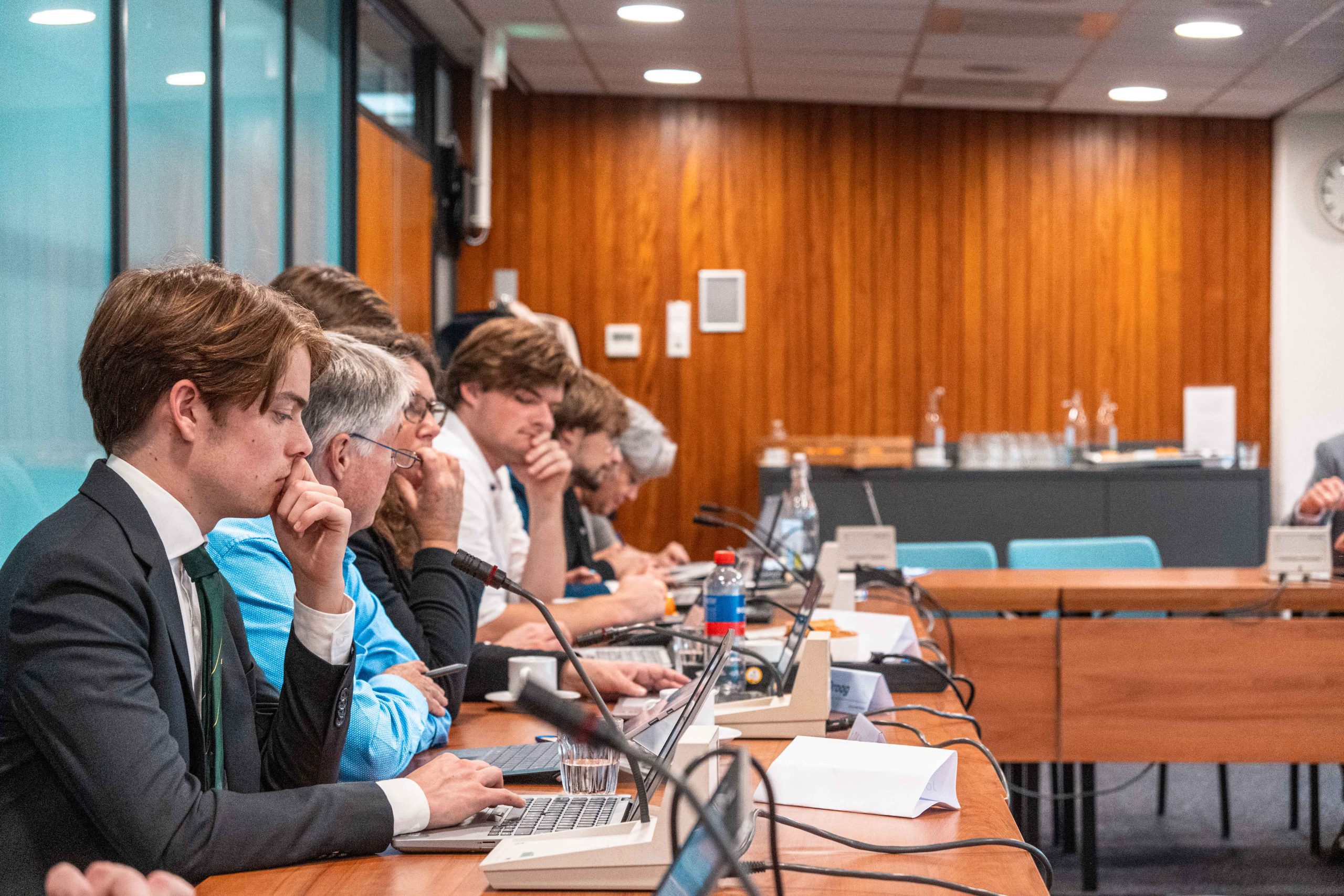The Student Council’s monthly consultation meeting had to proceed without the Executive Board, while both should have discussed the Inspectorate’s report publicly for the first time.
A meeting of the Student Council and Works Council in October 2023. (Photo: Thijs van Reeuwijk)
The meeting was the first consultation between the Student Council and the Executive Board in the planning since the Inspectorate of Education’s report was published on 1 March. In the report, the Inspectorate referred to a ‘high risk of social unsafety for all staff members’ and mismanagement.
The investigation did not cover students ‘as the signals that the Inspectorate received only referred to employees’. Nevertheless, the Student Council believes that the issue is also pressing among students, says Student Council Chair Jelle Stap (ORAS) at the meeting. “The report draws conclusions about the culture at TU Delft as a whole, and students are part of this.”
The members of the Student Council express their concerns about the situation in a joint statement. The conclusions are ‘severe’, but the Council is not surprised. “We recognise the picture sketched in the report and have previously received similar signals from students and staff.” The Council does not view the defensive reaction of the Executive Board as appropriate, and says that the Executive Board shows ‘little empathy’ and ‘little self-reflection’.
Poor communication with students
That TU Delft’s response to the report was only directed at staff is a thorn in the Student Council’s eye. It was only after repeated pushing by the Council that a message was sent to students. “Students read about it in the newspaper before they even heard about it from their own university,” says Council member Sam de Jong (Lijst Bèta). He also thinks that when the message was finally sent, the coordination was flawed. “Looking at how the different faculties dealt with the message showed that there was no coordination. Some faculties put it on Brightspace (the online learning environment, Eds.), and others did not do so.”
‘Draw lessons from student associations’ plans of action’
And this while students would be able to help TU Delft’s management solve problems, believes the Student Council. Students has done a lot over the years to improve the social safety at student associations, such as the ‘Are you ok?’ and ‘Raise the alarm’ campaigns, says Stap. “Draw lessons from these, look at their plans of action, and use their ideas.” The Student Council also wants to be involved in drawing up the plan of action that TU Delft is due to send to the Inspectorate on 19 May.
Sensitivity
The Council had also prepared some questions about the position of the Executive Board and the next steps. But they have not received any answers as Vice-Rector Magnificus Rob Mudde had reported ill.
Given the sensitivity of the issue, Danko Roozemond, the Education and Student Affairs Policy Advisor, who is replacing Mudde, can do little more than promise that he will pass on the questions. He does point out to the students that that morning an email was sent to all employees that explicitly mentioned students. That day, a similar message appeared on the TU Delft Student News web page.
Closed or public
The Student Council still expects to receive answers to its questions on Thursday 28 March when a meeting with the Works Council and the Executive Board is on the planning. Whether the meeting will be open to others has not yet been made known.
In a response to Delta’s questions, Student Council Chair Stap says that the Board’s office is still considering this. This is thought to be in connection with the action plan that is required by the Inspectorate and that will be discussed. “The action plan is a sensitive document that is not yet public,” explains Stap. If it were up to the Student Council, at least part of the meeting should be public. “We have submitted a lot of questions and would like them to be answered publicly.”
Findings
The Inspectorate of Education investigated transgressive behaviour at TU Delft from December 2022 to November 2023. In the resulting report, the investigators speak of intimidation, racism, sexism, bullying, exclusion, gossiping, social insecurity due to lack of leadership and a culture of fear, among other things. For instance, employees are said to be afraid to voice their opinions and hold each other accountable for behaviour.
The effects among TU Delft employees who have reported to the inspection are often long-lasting and hampering. The inspectorate speaks of psychological and physical health complaints, absence from work and a general feeling of insecurity. Stress, burnout, depression and PTSD, crying and tense home situations also occur, as do illness, vomiting at work, panic attacks and heart palpitations.
The inspectorate reports that TU Delft’s university administration has a lot of information regarding what is happening in terms of social safety, but that they ‘omit to add everything up so as to create a complete picture’. ‘The management’ also ‘does not adequately manage in terms of appropriate measures’. The Inspectorate believes that this is mismanagement.
Read the news and background articles on the Inspectorate’s report in our dossier.
- Delta is looking for current and former TU Delft staff members who are willing to share their experiences. This can be done anonymously if preferred. Email tudelta@protonmail.com.
Do you have a question or comment about this article?
E.S.Beinema@tudelft.nl


Comments are closed.